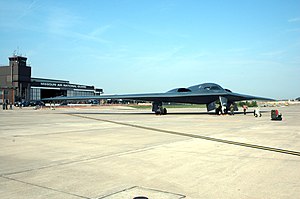110th Bomb Squadron
| 110th Bomb Squadron | |
|---|---|

B-2 Spirit stealth bomber operated by the Missouri Air National Guard 110th Bomb Squadron
|
|
| Active | 14 August 1917–present |
| Country |
|
| Allegiance |
|
| Branch |
|
| Type | Strategic Bombardment |
| Role | Squadron |
| Part of | Missouri Air National Guard |
| Garrison/HQ | Whiteman Air Force Base, Knob Noster, Missouri |
| Nickname(s) | "Lindbergh's Own" |
| Engagements |
World War I World War II Operation Northern Watch |
| Insignia | |
| 110th Bomb Squadron emblem |  |
The 110th Bomb Squadron (110 BS) is a unit of the Missouri Air National Guard 131st Bomb Wing located at Whiteman Air Force Base, Knob Noster, Missouri. The 110th is equipped with the B-2 Spirit.
The 110 BS is the oldest unit in the Missouri Air National Guard, with over 90 years of service to the state and nation. It is a descendant organization of the World War I 110th Aero Squadron, established on 14 August 1917. It was reformed on 23 June 1923, as the 110th Observation Squadron, and is one of the 29 original National Guard Observation Squadrons of the United States Army National Guard formed before World War II.
The 131st Bomb Wing, of which the 110th Bomb Squadron is a part, is the only Air National Guard Bomb Wing certified to conduct nuclear operations.
Established at Kelly Field, Texas in August 1917 as the 110th Aero Squadron. Constructed facilities and engaged in supply and related base support activities. Later re-designated as 804th Aero Squadron (1 February 1918), then "Squadron K, Kelly Field" in July 1918. Demobilized 1918 shortly after the Armistice with Germany.
Established by the Militia Bureau on 23 June 1923, which authorized the immediate organization of the 110th Observation Squadron, 35th Division of Aviation, Missouri National Guard. First Headquarters was located in a filling station on Manchester Avenue. From there it was moved to a small room over a grocery store on Olive Street Road In St Louis County. Meetings were held at the Airport, then little more than a pasture, there were no airplanes and no uniforms for the enlisted men.
The First flying Equipment was a Curtiss JN-4 "Jenny" which was purchased by the officers of the squadron and used for flight training until early 1924 when three surplus wartime JN-4's were received. The planes were housed in a corrugated sheet metal hangar erected on the field during the National Air Races in 1923 and later turned over to the squadron. Additional aircraft and equipment were received throughout 1924 and by the year's end a well received training program was in effect. Only eighteen months had elapsed since the unit was formally organized.
...
Wikipedia
